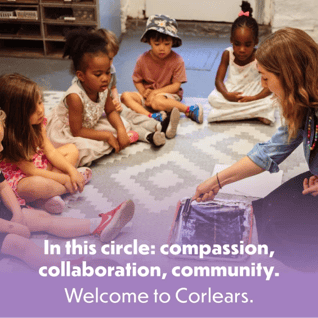The development of gross motor skills is not only important to a child's physical well-being, but to their cognitive health as well. At Corlears School, the Early Childhood curriculum is designed to encourage and strengthen these skills through a play-based approach that is responsive to our youngest students' emerging interests. Below, 3s head teacher Nyesha Hunt explains the importance of gross motor skills in early childhood, along with a few tips for helping your child strengthen them outside of the classroom.
Why Gross Motor Skills Matter
Gross motor skills involve the movement and coordination of large muscles in the body and are fundamental in early childhood. Developing these skills helps children build strength, balance, and coordination, all of which are essential for their physical well-being. These movements also support brain development, particularly in areas related to focus, problem-solving, and even social skills.
Structured and Unstructured Play
Each early childhood classroom spends part of each day in the school’s backyard to give children the opportunity to engage in free, unstructured play. This time allows them to run, climb, jump, and explore — activities that naturally encourage gross motor development. We also encourage further development through our physical education class where children have access to various games and activities in Corlears School's yard and gym. The mix of structured and unstructured play is an excellent opportunity for children to build on and practice their gross motor movements.
For our 3s classroom, starting the day outdoors has been a great way to give children space to release energy, setting a positive tone for the rest of the day. At home, we recommend establishing a similar routine with your child.
Neighborhood Walks
We incorporate neighborhood walks into our classroom routine, which provide new opportunities for movement, exploration, and observation of the world around us. The walks not only support physical development but also encourage curiosity and social engagement with our environment. Using walking as a learning opportunity — whether it’s exploring a new neighborhood or running an errand as a family — is a simple and effective way to encourage your child’s gross motor development.
Movement In and Out of the Classroom
We also incorporate movement throughout the day inside the classroom, which is something that can be replicated at home as well. Whether we are transitioning from one activity to another or taking a quick body break, movement is key. Children enjoy pretending to hop, jump, or gallop like different animals, and freeze-dancing always quickly becomes a favorite! These activities allow for playful learning and help children use their energy in creative ways.
The next time you and your child find yourselves going between activities, give yourselves a moment to move mindfully and remember that strengthening your little one’s gross motor skills can be an opportunity for fun!
.jpeg?width=290&name=Nyesha%20Hunt%2c%20Seedlings%20Associate%20Teacher%20(1).jpeg)


